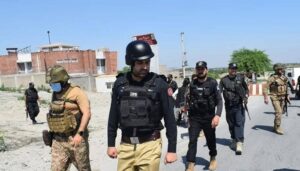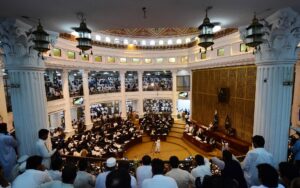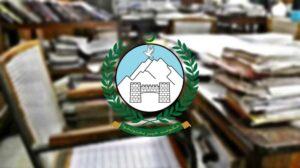PESHAWAR: The federal government has decided to reinstate the Action in Aid of Civil Power Regulations in Khyber Pakhtunkhwa and extended its scope to Balochistan, all under the National Action Plan.
Provinces have been mandated to ensure 100% registration of all madrassas, map foreign teachers and students in these institutions, and scrutinize their financial dealings.
The government has revised 13 key points of the National Action Plan, directing all provinces to implement them swiftly. These revised points, approved during a June meeting of the Federal Apex Committee, have been forwarded to provincial governments, which are now required to submit monthly progress reports.
One of the central tenets of the revised plan includes strict measures against militancy. Law enforcement agencies, including the police, have been assigned the task of preventing militants from accessing modern weapons and improving surveillance techniques. Additionally, the police, in collaboration with various government departments such as Information, Auqaf, and Higher Education, have been tasked with conducting public awareness campaigns.
Legal departments have been entrusted with the strengthening of laws against militancy, while the police will be responsible for dismantling the links between criminals and terrorists. Other critical sectors, such as finance, local government, and minerals, will be tasked with cutting off terrorists’ financial resources. Meanwhile, the Auqaf and Higher Education departments will collaborate with the police to cultivate a national consensus against terrorism.
Another priority is the control of terrorism-related content in the media. Under the Prevention of Electronic Crimes Act (PECA) 2016, both the police and the prosecution departments will work to curb online hate speech and extremist content.
Action is also being taken against the spread of religious hatred, with the police responsible for monitoring extremist organizations and limiting the misuse of loudspeakers. Religious scholars are expected to play a crucial role in this initiative, participating in regular dialogues with local authorities to prevent the spread of hate-based ideologies. Reforms in madrassas and mosques will be implemented by the Auqaf Department, while educational institutions will include the “Message of Pakistan” in their curricula to promote a peaceful national narrative.
The revised plan also includes measures to halt the funding of banned organizations and terrorist groups. Police and district administrations have been tasked with tracking illegal items and monitoring blind spots in surveillance systems. They will also work on establishing joint checkpoints, prevent the supply of drugs in educational institutions, and address illegal weapons and human trafficking. Measures to clamp down on smuggling and its links to terrorism are also in place.
One of the more complex points concerns improvements to the criminal justice system. The government is working to re-establish the Action in Aid of Civil Power Regulations in Khyber Pakhtunkhwa and implement it in Balochistan. This includes enhancing the investigation and prosecution processes, ensuring the conviction of terrorists, and improving inter-provincial coordination in high-profile cases. Special prosecution cells will be set up in the Counter-Terrorism Departments (CTD) of Khyber Pakhtunkhwa, Sindh, Balochistan, Islamabad, Gilgit-Baltistan, and Azad Kashmir, with joint investigation teams playing a critical role in this process.
To further bolster the CTDs’ capacity, new measures will be modeled after the Punjab system, including the establishment of forensic laboratories in partnership with Punjab. CTD officers will receive specialized training in investigation, cybercrime, and inquiry techniques. A policy to rehabilitate and reintegrate terrorists who surrender will also be developed, ensuring they become productive members of society.
A major initiative involves the registration of all madrassas and their comprehensive oversight. Mapping and monitoring foreign teachers and students in these institutions, as well as scrutinizing their financial activities, will now fall under the purview of district administrations. Madrassa reforms will also include auditing aid agencies linked to these religious institutions.
District-level reforms are another focal point of the revised National Action Plan. These include fast-tracking socioeconomic development, increasing the CTD’s capacity, training the Levies and Khasadar forces, and preventing hate speech. The Frontier Constabulary will be expanded to ensure its deployment for national projects.
Further reforms involve large-scale improvements to governance structures. Provincial governments are tasked with addressing governance issues, resolving disputes, and enacting reforms within the police and prison systems. This also includes fulfilling responsibilities under the 18th Amendment. The police and district administration have been given additional responsibilities, such as preventing the use of illegal mobile SIMs and overseeing the deportation of Afghan citizens with fake identity cards and passports. Efforts will also be made to repatriate illegal Afghan residents, with Afghan citizen cards and POR cards being closely monitored.
.












